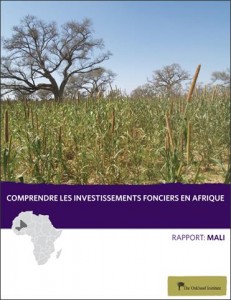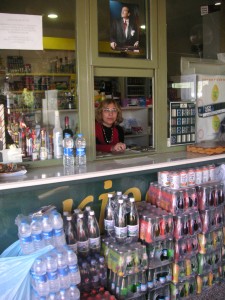SOCIAL PROJECTS

Int. Peasant Conference : Stop the land grab
Threat to Food Security http://allafrica.com/environment/
http://farmlandgrab.org/ http://www.business-humanrights.org/
UPDATE 19.11.2011 Center for Media and Democracy
http://www.facebook.com/CenterforMediaandDemocracy
https://www.facebook.com/FoodRightsNetwork
Join the Food Rights Network in adding what you know about the „Secret Farm Bill“ to the SourceWatch article. http://sourcewatch.org/Secret Farm Bill
Blogger, Attorney http://www.FarmPolicy.com
Contacts International Peasant Conference:
CNOP/VIA CAMPESINA Kalabancoura rue 200 porte 727 BP E 2169 Bamako/Mali
Chantal Jacovetti: chantal.jacovetti@wanadoo.fr Phone : 00223.76.81.87.93/64.86.89.26
Lamine Coulibaly: laminezie@gmail.com Phone: Tel: +223 76 17 09 79/ 66 83 63 14
Via Campesina (from Spanish la vía campesina, the campesino way, or the Peasants‘ Way) describes itself as „an international movement which coordinates peasant organizations of small and middle-scale producers, agricultural workers, rural women, and indigenous communities from Asia, Africa, America, and Europe“. It is a coalition of over 148 organizations, advocating family-farm-based sustainable agriculture and was the group that first coined the term „food sovereignty“. Food sovereignty refers to the right to produce food on one’s own territory. Via Campesina has carried out a Global Campaign for Agrarian Reform since 1999, in opposition to market-led agrarian reform. MORE
Food security hostage to trade in WTO negotiations: UN right to food expert
[16 November 2011] Geneva – „The world is in the midst of a food crisis which requires a rapid policy response. But the World Trade Organisation (WTO) agenda has failed to adapt, and developing countries are rightly concerned that their hands will be tied by trade rules.” http://www.srfood.org/index.php
Press invitation 17-19 November, Mali (Bamako, 28 October 2011) The farmers of the National Coordination of Farming Organizations (CNOP) in Mali and the international farmers’ movement Via Campesina hereby invite the press to cover the first international farmers’ conference whose objective is tostrengthen the fight against the land grabs which are rife in Africa and other parts of the world.
The conference will be held in Sélingué from 17 to 19 November 2011, and will bring together almost 200 farmers affected by land grabs as well as numerous other participants, including researchers, political figures, and NGOs resisting the unprecedented land-grab offensive by large businesses and hedge funds, among others, that compromises the ability of people to feed themselves.
Affected populations from all over the world will have the opportunity to make their voices heard, and strategies will be developed to end the seizure of farmland at the expense of the rural family farming that feeds 80% of the African population.
The conference will conclude on 20 November with a visit by a delegation to the Office du Niger’s land in Kolongo, a year after the first farmers’ meeting about this matter. There, journalists will be able to speak to farmers engaged in the resistance, local authorities, and experts on land issues.
The Oakland Institute As farmer groups and civil society organizations from around the world gather at the International Conference on Land Grabs [DRAFT PROGRAMME http://viacampesina.org/en/index.php] from November 17-20 2011 in Nyeleni, Mali, The Oakland Institute and the National Farmers Organisation Coordination (CNOP) of Mali are releasing a new report on land grabs in the west African country.
Comprendre les Investissements Fonciers en Afrique: Rapport Mali [http://www.oaklandinstitute.org/comprendre-les-investissements-fonciers-en-afrique-rapport-mali] is an updated, French version of the Oakland Institute’s Understanding Land Investment in Africa: Mali report that was published earlier this year.
This comprehensive report analyses the current trend of agricultural land investments in Mali, revealing that by the end of 2010 at least 544,567 hectares of fertile land have been leased or were under negotiation for lease in Mali. Despite the limited availability of arable land in Mali and dramatic hunger figures, more than 40% of deals will devote land to agrofuel crops-which are unlikely to benefit those suffering from hunger in Mali. These land acquisitions involve violent and flagrant abuses of human rights and the report documents attacks on smallholder populations in the irrigated agricultural zones of the Office du Niger. Most of the large-scale land acquisitions are concentrated in state-owned lands within the large, riverine delta of the Office du Niger, where informal customary rights of the local people are not protected by law, and are not recognized by public officials.
Olivier De Schutter — UN Special Rapporteur on the Right to Food — recently released a report extolling the benefits of ecological agriculture. In this short radio interview, he explains how today’s scientific evidence demonstrates that agro-ecological farming methods outperform the use of chemical fertilizers in boosting food production where the hungry live — especially in unfavorable environments.
While the government of Mali justifies the massive leasing of lands with the need to „modernize“ Malian agriculture, plans for large-scale irrigated agriculture pose great risks to the survival of populations dependent on the water flows of the Niger River in Mali as well as in the rest of West Africa, where over 100 million people depend on the river for their livelihoods.
America, it’s your responsibility to decide who will emerge victorious from this battle of the bulge. Let’s meet the contestants — the American consumer, the independent farmer and the corporate fat cat. Watch Food & Water Watch’s The Biggest Farm Bill Loser and go to http://www.foodandwaterwatch.org to demand a Fair Farm Bill!
Download the report: In French: http://www.oaklandinstitute.org/comprendre-les-investissements-fonciers-en-afrique-rapport-mali In English: http://oaklandinstitute.org/understanding-land-investment-deals-africa-mali
Latest Articles – #farmlandgrab
World Social Forum Dakar – Sign the Dakar appeal against land grabbing!! #video
Gegenrede: Offener Brief von Jean Ziegler #video
Eradicating Ecocide – Rights for the Planet #video
Climate Change, Food Sovereignty & Security #video
Africa – Green Agriculture & Climate Change #video
Sustainability and Equity: A Better Future for All
Kate Holt/IRIN
The 2011 Human Development Report, Sustainability and Equity: a Better Future for All, says bold steps must be taken to reduce environmental risks and inequalities in Africa. http://allafrica.com/environment/
According to the 2011 Human Development Report, released by the United Nations Development Programme, Africa’s progress in human development over the next four decades could outpace any other region of the world, but environmental challenges could threaten the continent’s advancement, possibly reversing it.
UPDATE 19.11.2011 Final Declaration: Stop Land-Grabbing Now!
by The Oakland Institute – Nyeleni, November 19, 2011
We, women and men peasants, pastoralists, indigenous peoples and their allies, who gathered together in Nyeleni from 17-19 November 2011, are determined to defend food sovereignty, the commons and the rights of small scale food providers to natural resources. We supported the Kolongo Appeal from peasant organizations in Mali, who have taken the lead in organising local resistance to the take-over of peasants‘ lands in Africa. We came to Nyeleni in response to the Dakar Appeal, which calls for a global alliance against land-grabbing.
In the past three days, peasants, pastoralists and indigenous peoples have come together from across the world for the first time to share with each other their experiences and struggles against land-grabbing. In Mali, the Government has committed to give away 800 thousand hectares of land to business investors. These are lands of communities that have belonged to them for generations, even centuries, while the Malian State has only existed since the 1960-s. This situation is mirrored in many other countries where customary rights are not recognised. Taking away the lands of communities is a violation of both their customary and historical rights.
Secure access to and control over land and natural resources are inextricably linked to the enjoyment of the rights enshrined in the Universal Declaration of Human Rights and several regional and international human rights conventions, such as the rights to an adequate standard of living, housing, food, health, culture, property and participation. We note with grave concern that states are not meeting their obligations in this regard and putting the interests of business interests above the rights of peoples.
Land-grabbing is a global phenomenon led by local, national and transnational elites and investors, and governments with the aim of controlling the world’s most precious resources. The global financial, food and climate crises have triggered a rush among investors and wealthy governments to acquire and capture land and natural resources, since these are the only “safe havens” left that guarantee secure financial returns. Pension and other investment funds have become powerful actors in land-grabbing, while wars continue to be waged to seize control over natural wealth. The World Bank and regional development banks are facilitating land grabs by promoting corporate-friendly policies and laws, facilitating capital and guarantees for corporate investors, and fostering an extractive, destructive economic development model. The World Bank, IFAD, FAO and UNCTAD have proposed seven principles that legitimise farmland grabbing by corporate and state investors. Led by some of the world’s largest transnational corporations, the Alliance for a Green Revolution in Africa (AGRA) aims to transform smallhold agriculture into industrial agriculture and integrate smallhold farmers to global value chains, greatly increasing their vulnerability to land-loss.
Land-grabbing goes beyond traditional North-South imperialist structures; transnational corporations can be based in the United States, Europe, Chile, Mexico, Brazil, Russia, India, China, South Africa, Thailand, Malaysia and South Korea, among others. It is also a crisis in both rural and urban areas. Land is being grabbed in Asia, Africa, the Americas and Europe for industrial agriculture, mining, infrastructure projects, dams, tourism, conservation parks, industry, urban expansion and military purposes. Indigenous peoples and ethnic minorities are being expelled from their territories by armed forces, increasing their vulnerability and in some cases even leading to slavery. Market based, false solutions to climate change are creating more ways to alienate local communities from their lands and natural resources.
Despite the fact that women produce most of the world’s food, and are responsible for family and community well being, existing patriarchal structures continue to dispossess women from the lands that they cultivate and their rights to resources. Since most peasant women do not have secure, legally recognised land rights, they are particularly vulnerable to evictions.
The fight against land-grabbing is a fight against capitalism, neoliberalism and a destructive economic model. Through testimonies from our sisters and brothers in Burkina Faso, Columbia, Guatemala, Democratic Republic of Congo, France, Ghana, Guinea Bissau, Honduras, India, Indonesia, Mali, Mauritania, Mozambique, Nepal, Niger, Senegal, South Africa, Thailand and Uganda, we learned how land-grabbing threatens small scale, family based farming, nature, the environment and food sovereignty. Land grabbing displaces and dislocates communities, destroys local economies and the social-cultural fabric, and jeopardizes the identities of communities, be they farmers, pastoralists, fisherfolk, workers, dalits or indigenous peoples. Those who stand up for their rights are beaten, jailed and killed. There is no way to mitigate the impacts of this economic model and the power structures that promote it. Our lands are not for sale or lease.
But we are not defeated. Through organisation, mobilisation and community cohesiveness, we have been able to stop land-grabbing in many places. Furthermore, our societies are recognising that small-scale, family based agriculture and food production is the most socially, economically and environmentally sustainable model of using resources.
Recalling the Dakar Appeal, we reiterate our commitment to resist land-grabbing by all means possible, to support all those who fight land-grabs, and to put pressure on national governments and international institutions to fulfill their obligations to defend and uphold the rights of peoples. Specifically, we commit to:
- Organise rural and urban communities against land-grabs in every form.
- Strengthen the capacities of our communities and movements to reclaim and defend our rights, lands and resources.
- Win and secure the rights of women in our communities to land and natural resources.
- Create public awareness about how land grabbing is creating crises for all society.
- Build alliances across different sectors, constituencies, regions, and mobilise our societies to stop land-grabbing
- Strengthen our movements to achieve and promote food sovereignty and genuine agrarian reform
In order to meet the above commitments, we will develop the following actions:
- Report back to our communities the deliberations and commitments of this Conference.
- Institutionalise April 17 as the day of global mobilisation against land-grabbing; also identify additional appropriate dates that can be used for such mobilisations to defend land and the commons.
- Develop our political arguments to expose and discredit the economic model that spurs land-grabbing, and the various actors and initiatives that promote and legitimise it.
- Build our own databases about land-grabbing by documenting cases, and gathering the needed information and evidence about processes, actors, impacts, etc.
- Ensure that communities have the information they need about laws, rights, companies, contracts, etc., so that they can resist more effectively the business investors and governments who try to take their lands and natural resources.
- Set up early warning systems to alert communities to risks and threats.
- Establish a Peoples‘ Observatory on land-grabbing to facilitate and centralise data gathering, communications, planning actions, advocacy, research and analysis, etc.
- Strengthen our communities through political and technical training, and restore our pride in being food producers and providers.
- Secure land and resource rights for women by conscientising our communities and movements, targeted re-distribution of land for women, and other actions make laws and policies responsive to the particular needs of women.
- Build strong organisational networks and alliances at various levels–local, regional and international–building on the Dakar Appeal and with small-scale food producers/providers at the centre of these alliances.
- Build alliances with members of pension schemes in order to prevent pension fund managers from investing in projects that result in land grabbing.
- Make our leaders abide by the rules set by our communities and compel them to be accountable to us, and our communities and organisations.
- Develop our own systems of legal aid and liaise with legal and human rights experts.
- Condemn all forms of violence and criminalisation of our struggles and our mobilizations in defense of our rights.
- Work for the immediate release of all those jailed as a result of their struggles for their lands and territories, and urgently develop campaigns of solidarity with all those facing conflicts.
- Build strategic alliances with press and media, so that they report accurately our messages and realities; counter the prejudices spread by the mainstream media about the land struggles in Zimbabwe.
- Develop and use local media to organise members of our and other communities, and share with them information about land-grabbing.
- Take our messages and demands to parliaments, governments and international institutions.
- Identify and target local, national and international spaces for actions, mobilizations and building broad-based societal resistance to land-grabbing.
- Plan actions that target corporations, (including financial corporations), the World Bank and other multilateral development banks that benefit from, drive and promote land and natural resource grabs.
- Expand and strengthen our actions to achieve and promote food sovereignty and agrarian reform.
- Support peoples‘ enclosures of their resources through land occupations, occupations of the offices of corporate investors, protests and other actions to reclaim their commons.
- Demands that our governments fulfill their human rights obligations, immediately stop land and natural resource transfers to business investors, cancel contracts already made, and protect rural and urban communities from ongoing and future land-grabs.
We call all organizations committed to these principles and actions to join our Global Alliance against Land-Grabbing, which we solemnly launch today here in Nyeleni. Globalise the struggle! Globalise hope!
#anatolia #turkey #growth #jobs 14.11.2011
Climate Change, Food Sovereignty & Security
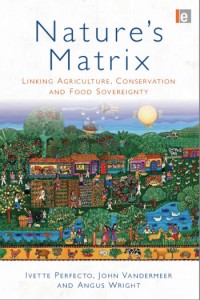
www.oneclimate.net Food security refers to the availability of food and one’s access to it. A household is considered food-secure when its occupants do not live in hunger or fear of starvation. According to the World Resources Institute, global per capita food production has been increasing substantially for the past several decades. In 2006, MSNBC reported that globally, the number of people who are overweight has surpassed the number who are undernourished – the world had more than one billion people who were overweight, and an estimated 800 million who were undernourished. According to a 2004 article from the BBC, China, the world’s most populous country, is suffering from an obesity epidemic. In India, the second-most populous country in the world, 30 million people have been added to the ranks of the hungry since the mid-1990s and 46% of children are underweight.
www.1billionhungry.org Worldwide around 852 million people are chronically hungry due to extreme poverty, while up to 2 billion people lack food security intermittently due to varying degrees of poverty (source: FAO, 2003). Six million children die of hunger every year – 17,000 every day. As of late 2007, export restrictions and panic buying, US Dollar Depreciation,increased farming for use in biofuelsworld oil prices at more than $100 a barrel, global population growth,climate change,loss of agricultural land to residential and industrial development,and growing consumer demand in China and Indiaare claimed to have pushed up the price of grain. However, Nonetheless, food riots have recently taken place in many countries across the world. Read More: > HERE <
As the Nobel Prize-winning economist Amartya Sen has observed that „there is no such thing as an apolitical food problem.“ While drought and other naturally occurring events may trigger famine conditions, it is government action or inaction that determines its severity, and often even whether or not a famine will occur. The 20th century is full of examples of governments undermining the food security of their own nations–sometimes intentionally.
There are many economic approaches advocated to improve food security in developing countries. Three typical approaches are listed below, click here . The first is typical of what is advocated by most governments and international agencies. The other two are more common to non-governmental organizations (NGO’s).
The third approach is known as food sovereignty; though it overlaps with food justice on several points, the two are not identical. It views the business practices of multinational corporations as a form of neocolonialism click here.
It contends that multinational corporations have the financial resources available to buy up the agricultural resources of impoverished nations, particularly in the tropics. They also have the political clout to convert these resources to the exclusive production of cash crops click here ,for sale to industrialized nations outside of the tropics, and in the process to squeeze the poor off of the more productive lands. Under this view subsistence farmers are left to cultivate only lands that are so marginal in terms of productivity as to be of no interest to the multinational corporations. Likewise, food sovereignty holds it to be true that communities should be able to define their own means of production and that food is a basic human right.
With several multinational corporations now pushing agricultural technologies on developing countries, technologies that include improved seeds, chemical fertilizers, and pesticides, crop production has become an increasingly analyzed and debated issue. Many communities calling for food sovereignty are protesting the imposition of Western technologies on to their indigenous systems and agency.
Those who hold a „food sovereignty“ position advocate banning the production of most cash crops in developing nations, thereby leaving the local farmers to concentrate on subsistence agriculture. In addition, they oppose allowing low-cost subsidized food from industrialized nations into developing countries, what is referred to as „import dumping“. Import dumping also happens by way of food aid distribution through programs like the USA’s „Food for Peace“ initiative.
www.fao.org , www.vandanashiva.org Vandana Shiva (Hindi: वन्दना शिवा; b. November 5, 1952, Dehra Dun, Uttarakhand, India), is a philosopher, environmental activist, eco feminist and author of several books. Shiva, currently based in Delhi, is author of over 300 papers in leading scientific and technical journals. She received her Ph.D. in philosophy from the University of Western Ontario, Canada, in 1978 with the doctoral dissertation:“Hidden variables and locality in quantum theory. Read More: > HERE < , Food Commodities Speculation and Food Price Crises http://www.srfood.org
Food Security Guide – Over one billion people experience the hardship that hunger imposes, a figure which continues to rise even amidst the riches of the 21st century. Engulfed within a vortex of population growth, economic instability and climate change, food security has become an urgent challenge for national and global governance. However, the feeble outcome of the 2009 World Summit on Food Security suggests that the richer countries are not yet ready to reorganise their dysfunctional priorities. http://uk.oneworld.net/guides/food
WASHINGTON (MarketWatch) — Those of us who believe that the economy should serve us instead of the other way around are conflicted. We know that the only way to end unemployment at home and poverty around the world is to make the economy grow faster. But we also know that nothing can grow forever, that the faster the global economy grows, the sooner we’ll run out of essential resources, including fossil fuels, water, arable land, healthy ecosystems and moderate climate. Economists and politicians can’t admit it, but the laws of physics apply, no matter what the latest polls tell us. The Earth has finite resources that will someday limit our economic growth.
The Earth cannot forever support 7 billion people consuming as much as Americans consume. And yet we’ve staked our future — individually, nationally, and maybe even as a species — on that impossible dream.
SOLUTIONS – Prosperity Without Growth, Professor Tim Jackson: Growth has delivered its benefits, at best, unequally. A fifth of the world’s population earns just 2% of global income. Inequality is higher in the OECD nations than it was 20 years ago. And while the rich got richer, middle-class incomes in Western countries were stagnant in real terms long before the recession. Far from raising the living standard for those who most needed it, growth let much of the world’s population down. Wealth trickled up to the lucky few.
Accordingly, this report sets out a critical examination of the relationship between prosperity and growth. It acknowledges at the outset that poorer nations stand in urgent need of economic development. But it also questions whether ever-rising incomes for the already-rich are an appropriate goal for policy in a world constrained by ecological limits. Its aim is not just to analyse the dynamics of an emerging ecological crisis that is likely to dwarf the existing economic crisis. But also to put forward coherent policy proposals that will facilitate the transition to a sustainable economy. In short, this report challenges the assumption of continued economic expansion in rich countries and asks: is it possible to achieve prosperity without growth?
In short, a ‘green stimulus’ is an eminently sensible response to the economic crisis. It offers jobs and economic recovery in the short term, energy security and technological innovation in the medium term, and a sustainable future for our children in the long term. Nonetheless, the default assumption of even the ‘greenest’ Keynesian stimulus is to return the economy to a condition of continuing consumption growth. Since this condition is unsustainable, it is difficult to escape the conclusion that in the longer term something more is needed. A different kind of macro-economic structure is essential for an ecologically-constrained world.
The above is an excerpt www.ecobuddhism.org : The full report can be downloaded here .
Available in PDF: New briefing: Food safety for whom? Corporate wealth versus people’s health by GRAIN, May 2011, further informations: www.corpwatch.org
A new briefing by GRAIN examines how „food safety“ is being used as a tool to increase corporate control over food and agriculture, and discusses what people can do and are doing about it. Below is a snapshot of what’s inside. The full briefing is available here.
View some additional photos here.
Bahá’í – Religion für eine neue Zeit
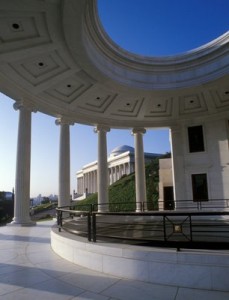
The Bahá’í Faith is a monotheistic religion founded by Bahá’u’lláh (see also Aposteles of Bahá’u’lláh) nineteenth-century Persia, emphasizing the spiritual unity of all humankind. There are an estimated five to six million Bahá’ís around the world in more than 200 countries and territories. In the Bahá’í Faith, religious history is seen to have unfolded through a series of divine messengers, each of whom established a religion that was suited to the needs of the time and the capacity of the people. These messengers have included Abraham, the Buddha, Jesus, Muhammad and others, and most recently the Báb ( ~ John the Baptist/Mandeism) and Bahá’u’lláh. In Bahá’í belief, each consecutive messenger prophesied of messengers to follow, and Bahá’u’lláh’s life and teachings fulfilled the end-time promises of previous scriptures. Humanity is understood to be in a process of collective evolution, and the need of the present time is for the gradual establishment of peace, justice and unity on a global scale. Read More: > HERE <
The persecution of Bahá’ís is the religious persecution of Bahá’ís in various countries, especially in Iran,where the Bahá’í Faith originated and the location of one of the largest Bahá’í populations in the world. The origins of persecution stem from a variety of Bahá’í teachings that challenge traditional Islamic belief, including the finality of Muhammad’s prophethood, and places Bahá’ís outside the Islamic faith. Thus Bahá’ís are seen as apostates from Islam, and, according to some, must choose between repentance and death.
Bahá’ís as well as the United Nations, Amnesty International, the European Union, the United States and peer-reviewed academic literature have stated that the members of the Bahá’í community in Iran have been subjected to unwarranted arrests, false imprisonment, beatings, torture, unjustified executions, confiscation and destruction of property owned by individuals and the Bahá’í community, denial of employment, denial of government benefits, denial of civil rights and liberties, and denial of access to higher education. Read More: > HERE <
Iran (i /ɪˈrɑːn/ or /ɪˈræn/; Persian: ایران;), officially the Islamic Republic of Iran is a country in Central Eurasia and Western Asia. It is a country of particular geostrategic significance owing to its location in the Middle East and central Eurasia. Iran is a regional power,and holds an important position in international energy security and world economy as a result of its large reserves of petroleum and natural gas. Iran is a founding member of the UN, NAM, OIC and OPEC. Read More: >HERE<
Belief and practice –Bahá’í teachings focus on unity – the oneness of God, the oneness of religion, and the oneness of the human race. A central belief is progressive revelation – that God progressively reveals His teachings for humanity through a series of divine educators that become the founders of the world’s great religions. Among these religions are the Bahá’í Faith, Buddhism, Christianity, Hinduism, Islam, Judaism, and Zoroastrianism.
The founder of the Bahá’í Faith was Bahá’u’lláh, who wrote the equivalent of a hundred volumes and laid down principles for a new pattern of human society. Some of these principles are: the independent investigation of truth by each person, the elimination of extremes of wealth and poverty, a spiritual solution to economic problems, the unity of all peoples and the elimination of prejudice, the equality of women and men, the harmony of science and religion, universal education, the establishment of a universal auxiliary language. All Information click here
International artists and religious leaders come together to call for human rights and religious freedom in Iran. Belief Behind Bars (Part 1 of 19)
TV-TIPP: Bahai – Religion für eine neue Zeit (ORF/3sat) – Israel ist das Heilige Land der drei großen Offenbarungsreligionen: des Judentum, des Christentum und des Islam. Doch Israel ist auch das Heilige Land einer vierten – noch nicht so bekannten – Weltreligion: der Baha’i.Wieso entscheiden sich Österreicher, wie die Familie Penz aus Hall in Tirol dazu, sich dieser neuen Religion anzuschließen? Der 45-jährige Andreas Penz bringt es auf den Punkt: „Weil ich zum ersten Mal von einer Einheit der Menschheit und der Einheit der Religionen gehört habe – das war für mich wie ein Blitzlicht.“
Für die Dokumentation „Baha’i – Religion für eine neue Zeit“ besuchte Regisseurin Pia Patricia Schweizer Familie Penz in Tirol und erkundete gemeinsam mit der 22-jährigen Tochter Marina die „Magie“ der heiligen Stätten der Baha’i in Israel. In Haifa befindet sich das geistige und administrative Zentrum dieser jüngsten Weltreligion. Sie glauben an den einen Gott, haben ihre eigenen Heiligen Schriften und einen Religionsstifter mit dem Namen Baha’u’llah. Weltweit bekennen sich etwa sechs Millionen Menschen zu diesem Glauben. Die 22-jährige Tochter der Familie Penz, Marina, ist Baha’i und hat sich entschieden, ein „Freiwilliges Soziales Jahr“ in Haifa zu machen.
Die „Hängenden“ oder die „Persischen Gärten“ der Baha’i sind eine perfekte Komposition aus Architektur und Natur. Die neunzehn Terrassen auf dem Berg Karmel wurden gemeinsam mit dem Mausoleum des Bab 2008 von der UNESCO zum Weltkulturerbe erklärt. Seit der Eröffnung der Terrassen im Jahr 2001 wurden sie von zwei Millionen Menschen besucht; an manchen Tagen kommen bis zu 3000 Besucher. Die 1953 erbaute goldene Kuppel des Mausoleums, die von den Baha’i „Königin des Karmel“ genannt wird, ist das Wahrzeichen der Stadt Haifa.
Größte religiöse Minderheit im Iran – Bis heute werden Baha’i im Land ihrer Entstehung, im Iran, verfolgt. Sie sind die größte religiöse Minderheit, genießen aber keinerlei Schutz wie Juden oder Christen. Die Vereinten Nationen und die Europäische Union äußerten sich wiederholt besorgt über die Unterdrückung der Baha’í. So wird der Iran in einer UNO-Resolution vom 21. Dezember 2010 erneut wegen schwerer Menschenrechtsverletzungen und der Diskriminierung von Bahá’í scharf verurteilt.
Marinas Eltern in Tirol sind vor neun Jahren Baha’i geworden. Sie lieben die Berge ihrer Heimat, sind Mitglieder des örtlichen Radlerclubs und spielen Theater. Das Einzige, was sie von ihrem überwiegend katholischen Umfeld unterscheidet, ist ihre Religion. „Es war für mich immer klar, dass es eine höhere Macht gibt, dass es einen Gott gibt, und als ich dann die Baha’i-Religion kennengelernt habe, haben sich für mich sehr viele Fragen beantwortet. Es hat mein Leben von der inneren Einstellung wesentlich geändert, alles ist viel größer geworden – und man hat auf einmal vom eigenen Leben über die Landesgrenzen hinaus geschaut.“, sagt Andreas Penz rückblickend. Eine Konsequenz des Baha’i-Glaubens ist ein entschiedenes soziales Engagement.
Haleh Arbab, Vertreterin der Internationalen Baha’i-Gemeinde in Haifa: „Bei unserer Religion geht es hauptsächlich um die geistige Wandlung des Einzelnen und auch um die gesellschaftliche Neugestaltung – es ist eine Religion, für die beides wichtig ist….Wir als Baha’i entwickeln uns zu geistigen Menschen, indem wir die Heiligen Schriften lesen, meditieren, an uns selbst arbeiten, aber auch, indem wir für die Gesellschaft tätig sind – und das vor allem durch den Dienst an Anderen.“ In über 900 großangelegten, nachhaltigen sozialen und wirtschaftlichen Entwicklungsprojekten in aller Welt, darunter auch 500 Schulen, soll das umgesetzt werden.
Es gibt nicht nur die „eine Wahrheit“ – Die Baha’i sind davon überzeugt, in ihrer Religion den Kern und die Sehnsucht aller Religionen vereint zu haben. Sie verstehen sich als Fortsetzung der bereits vorhandenen Religionen. Vielleicht auch als deren Erfüllung. Und sie glauben, dass die göttliche Offenbarung weitergehen wird. Die „eine Wahrheit“ gibt es für sie nicht. Die Aufgabe des Menschen ist es, weiter zu lernen und sich verantwortlich für die Zukunft der Menschheit einzusetzen. Und so arbeiten sie alle für Baha’u’llahs Versprechen: „Die Erde ist nur ein Land, und alle Menschen sind seine Bürger.“ > Sendedaten: Montag, 31. Jänner 2011 um 22.25 Uhr Wiederholungen (3sat)
„Rechte der Baha’i im Iran schützen“ Außenminister Dr.Spindelegger appelliert an den Iran
A Voice from Prison – Farsi Poem
- Meet MDGs We Can End Poverty, friends, fans at fb
- Meet FAIR TRADE, friends, fans at fb < & www.ethicalconsumer.org
- Meet World Ressource Institute, studies, friends, fans at fb
- Meet UN Educational, Scientific & Cultural Organization (UNESCO) at fb
- Meet Alternative Energy News, studies , friends fans at fb
- Meet The Oil Drum, studies, friends, fans at fb
- Meet Council for a Parliament of the World’s Religions (CPWR) at fb
- Peace, Paix, 和平, Salam, Shalom, Pace, Mir, Friede, Paz, Shanti, Heiwa …
CONFERENCE: The City of Kashgar
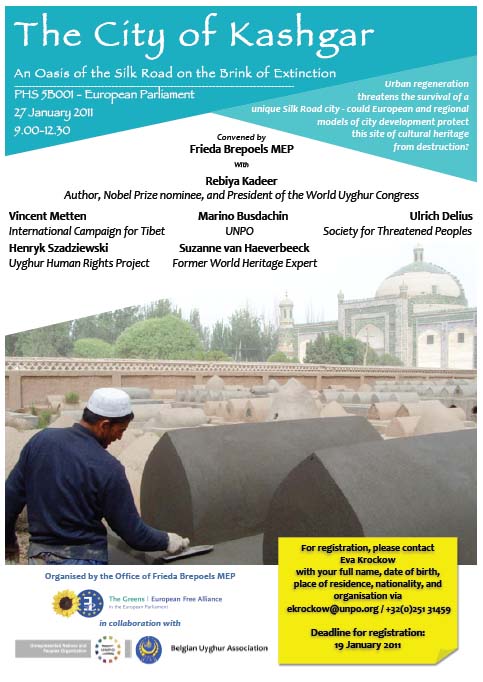
www.rferl.org Radio Free Europe
The Silk Road (or Silk Routes) is an extensive interconnected network of trade routes across the Asian continent connecting East, South, and Western Asia with the Mediterranean world, as well as North and Northeast Africa and Europe. In recent years, both the maritime and overland Silk Routes are again being used, often closely following the ancient routes.Read More: > HERE <
The Uyghur (Uyghur: ئۇيغۇر, ULY: Uyghur; simplified Chinese: 维吾尔; traditional Chinese: 維吾爾) are a Turkic ethnic group living in Eastern and Central Asia. Today, Uyghurs live primarily in the Xinjiang Uyghur Autonomous Region in the People’s Republic of China. An estimated 80% of Xinjiang’s Uyghurs live in the southwestern portion of the region, the Tarim Basin. The largest community of Uyghurs outside Xinjiang in China is in Taoyuan County, in south-central Hunan province.Outside of China, large diasporic communities of Uyghurs exist in the Central Asian countries of Kazakhstan, Kyrgyzstan, and UzbekistanSmaller communities are found in major cities in Afghanistan, Pakistan, and Turkey. Read More: > HERE <
The City of Kashgar: An Oasis of the Silk Road on the Brink of Extinction – Two years into Beijing’s ‘Kashgar Dangerous House Reform’, and the Old City of Kashgar in East Turkestan, or China’s Xinjiang Uyghur Autonomous Region (XUAR), faces near total destruction.
There is a pressing need to assess the damage incurred, implications for the region’s Uyghur population, and to identify ways in which damage can be mitigated.
To address this urgent need, Ms Frieda Brepoels MEP will convene a conference, ‘Kashgar: An Oasis of the Silk Road on the Brink of Extinction’ at the European Parliament in Brussels from 9.00–12.30 on 27 January 2011 in collaboration with the Unrepresented Nations and Peoples Organization (UNPO) and the Belgian Uyghur Association. For more information on the event please refer to http://www.unpo.org/article/12104
After opening remarks by Rebiya Kadeer, Nobel Peace Prize nominee and President of the World Uyghur Congress, international experts including Henryk Szadziewski, Manager of the Uyghur Human Rights Project, Washington, and Ulrich Delius, German Society for Threatened Peoples, will provide a rare glimpse into one of the defining cultures of Central Asia and an internationally significant Silk Road city that has witnessed Tamerlane, Genghis Khan and Marco Polo but is excluded from applications for UNESCO World Heritage status due to political reasons.
In the keynote address for the Oslo Freedom Forum 2010, Uyghur leader Rebiya Kadeer reveals the plight of her people under the repressive Chinese government. Like the Tibetans, the Uyghurs are living in an open prison, forced to abandon their culture, subjected to torture, imprisonment, and execution for speaking out.
Drawing on the historical lessons taught by the international case studies of Lhasa and Bruges, Vincent Metten, EU Policy Director of the International Campaign for Tibet, and Suzanne van Haeverbeek, former Flemish world heritage expert, will discuss how international intervention may prevent Kashgar’s further destruction and avoid the total and irreversible loss of a unique site of cultural and architectural heritage.
www.wsk.at Vienna Boy´s Choir www.uyghurensemble.co.uk
BELUR MATH – REGENERATE RURAL INDIA
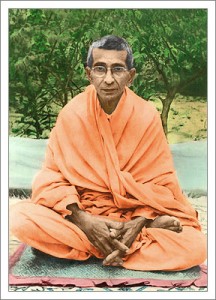
www.ramakrishna.org N.Y.
Advaita Vedanta (Advaita VedÄ�nta; Sanskrit अद्वैत वेदान्त ) is considered as the most influential sub-school of the VedÄ�nta (literally, end or the goal of the Vedas, Sanskrit) school of Hindu philosophy. Other sub-schools of VedÄ�nta are Dvaita and ViśishṭÄ�dvaita. Advaita (literally, non-duality) is a monistic system of thought. „Advaita“ refers to the identity of the Self (Atman) and the Whole (Brahman).
The key source texts for all schools of VedÄ�nta are the Prasthanatrayi—the canonical texts consisting of the Upanishads, the Bhagavad Gita and the Brahma Sutras. The first person to explicitly consolidate the principles of Advaita Vedanta was Adi Shankara, while the first historical proponent was Gaudapada, the guru of Shankara’s guru Govinda Bhagavatpada. Read More: > Here <
Belūr Maṭh is the headquarters of the Ramakrishna Math and Mission, founded by Swami Vivekananda, a chief disciple of Ramakrishna Paramahamsa. It is located on the west bank of Hooghly River, Belur, West Bengal, India and is one of the significant institutions in Calcutta. The temple is notable for its architecture that fuses Hindu, Christian and Islamic motifs as a symbol of unity of all religions. Read More: > HERE <
The essence of Vedanta is that there is but one Being and that every soul is that Being in full, not a part of that Being. All the sun is reflected in each dew-drop. Appearing in time, space and causality, this Being is man, as we know him, but behind all appearance is the one Reality. Unselfishness is the denial of the lower or apparent self. We have to free ourselves from this miserable dream that we are these bodies. We must know the truth, „I am He“. We are not drops to fall into the ocean and be lost; each one is the whole, infinite ocean, and will know it when released from the fetters of illusion. Infinity cannot be divided, the „One without a second“ can have no second, all is that One. The Vedanta says that the Soul is in its nature Existence absolute, Knowledge absolute, Bliss absolute.
The ideology of Ramakrishna Math and Mission consists of the eternal principles of Vedanta as lived and experienced by Sri Ramakrishna and expounded by Swami Vivekananda. This ideology has three characteristics: it is modern in the sense that the ancient principles of Vedanta have been expressed in the modern idiom; it is universal, that is, it is meant for the whole humanity; it is practical in the sense that its principles can be applied in day-to-day life to solve the problems of life. The basic principles of this ideology are given here: http://belurmath.org/Ideology.htm
http://belurmath.org/what_new.htm Releasing shortly… A Documentary on BELUR MATH The heart of Ramakrishna Movement . Bhakti Yoga does not say ‚give up‘; it only says ‚Love; love the Highest‘; and everything low naturally falls off from him, the object of whose love is this Highest. — Swami Vivekananda / 12th January is celebrated as National Youth Day but do we know the relevance of this day? What is one supposed to do on this day, how does one celebrate? Is it a holiday?
AN APPEAL – Situated in one of the most picturesque spots of the Himalayas at a height of about 7000 ft., Advaita Ashrama, Mayavati, was started by Swami Vivekananda in 1899. It is a branch of Ramakrishna Math, Belur. The special object of the Ashrama, as its name implies, is to study, practise, and preach Advaita or the eternal truth of the Oneness of all existence. This centre has been entrusted with the publication and propagation of Ramakrishna-Vivekananda and Vedanta literature. It is also publishing Prabuddha Bharata, the oldest English monthly magazine in India, since the last 115 years.
Apart from being a monastery, this Ashrama runs a hospital called the Mayavati Charitable Hospital. It came into being in response to the pressing needs of the neighbouring villages, where live some of the poorest people of the country. Patients come here from distant places across hills and dales, sometimes trudging a distance of nearly 50 km. Their helplessness in sickness would touch any heart if only it were known. We run a 25 bed indoor hospital and an outdoor patients department in this out-of-the way place since 1903. All treatment is done free of charges. Moreover, Surgical Camps, Dental Camps, Urological Camps, Eye Camps etc. are held throughout the year to provide special care to the poor villagers of Kumaon region. We bring qualified doctors from different cities to conduct such medical camps.
In order to accommodate these doctors we are building a Doctors‘ Quarters cum guest house. The new doctors’ quarters will have 8 rooms with attached baths for the doctors on the first floor and 6 rooms for guests and a meditation hall on the second floor. We request you to contribute liberally for this cause
The expected cost of construction, as submitted by the architects, will be Rs. 60 lakhs. Transportation cost is very high here because the materials have to be procured from 150 to 450 km away. The uplift of the backward and downtrodden has always been one of the key objectives of Ramakrishna Math & Ramakrishna Mission, of which this Ashrama is a branch. It is needless to mention here that if this institution has attained to its present stature, it is because of love, sympathy, and benevolence of charitably inclined people like you. The donation has to be made in favour of Advaita Ashrama and can be sent to the address given below.
May the Lord help us work in a true spirit of worship.
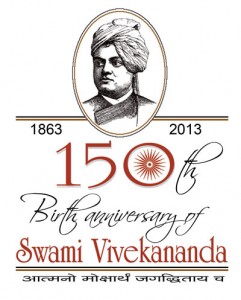
Activities of Ramakrishna Math and Ramakrishna Mission
From April 2006 to March 2007
- TYPES OF SERVICE
- Medical Service
- Educational Service
- Work in Rural and Tribal Areas
- Relief and Rehabilitation Work
- Women Welfare Programmes
- Youth Welfare Programmes
- Mass Contact
- Spiritual and Cultural Work
- Celebrations
- http://belurmath.org/activities.htm#Tribal
- Prabuddha Bharata Journal started by Vivekananda 1896
Africa – Green Agriculture & Climate Change
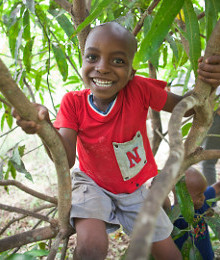
http://kofiannanfoundation.org
Sustainable agriculture is the practice of farming using principles of ecology, the study of relationships between organisms and their environment. It has been defined as „an integrated system of plant and animal production practices having a site-specific application that will, over the long term:Satisfy human food and fiber needs Make the most efficient use of non-renewable resources and on-farm resources and integrate, where appropriate, natural biological cycles and controls Sustain the economic viability of farm operations Enhance the quality of life for farmers and society as a whole. Read More: > Here <
Fair trade is an organized social movement and market-based approach that aims to help producers in developing countries make better trading conditions and promote sustainability. The movement advocates the payment of a higher price to producers as well as social and environmental standards. It focuses in particular on exports from developing countries to developed countries, most notably handicrafts, coffee, cocoa, sugar, tea, bananas, honey, cotton, wine, fresh fruit, chocolate, flowers and gold. Read More: > HERE <
AGRA ALLIANCE works to achieve a food secure and prosperous Africa through the promotion of rapid, sustainable agricultural growth based on smallholder farmers. Smallholders–the majority women–produce most of Africa’s food, and do so with minimal resources and little government support. AGRA aims to ensure that smallholders have what they need to succeed: good seeds and healthy soils; access to markets, information, financing, storage and transport; and policies that provide them with comprehensive support. Through developing Africa’s high-potential breadbasket areas, while also boosting farm productivity across more challenging environments, AGRA works to transform smallholder agriculture into a highly productive, efficient, sustainable and competitive system, and do so while protecting the environment.
AFRICA LOSES ROUGHLY $4 Billion in soil nutrients each year, costing farmers in lost productivity and eroding the continent’s ability to feed itself. But simple solutions can reverse the trend. AGRA’s programs in soil health are working to restore 6.3 million hectares of degraded farmland over 10 years. Whether it’s setting Africa’s first digital soil map to monitor the problem and inform decision making or promoting the use of lime to counteract western Kenya’s acidic soils or increasing the use of fertilizer microdosing by farmers in the Sahel, AGRA is focused on stemming the crisis and transforming Africa’s soils form a curse into blessing for smallholder farmers.
www.globalhealthfreedom.org www.foodfreedomejournal.org
Father Godfrey Nzamujo is the founder and director of the Songhai Centre, a pioneering farm, training and research centre in Porto Novo, Benin. Begun in 1985 on a single hectare of land, the Songhai project has expanded to six sites in Benin and one in Nigeria. With the motto ‚Commitment to Excellence‘, Songhai symbolises Nzamujo’s belief that Africa’s ecological characteristics are advantages rather than impediments. Father Nzamujo was awarded the Hunger Project’s Africa Prize for Leadership in 1993, and is the author of Songhaï: When Africa lifts up its head. Stirring revolution in African Rice: www.new-ag.info
Songhaï aspires to develop alternatives allowing Africans to stand on their feet through agricultural entrepreneurship, in an integrated development framework enhancing agriculture, industry and services. This development is centred, above all, on human development, the realization of local resources and the appropriation of foreign techniques and technologies.
VISION To establish an entrepreneurial platform of integrated development, an enabling environment to find social, economic, technical, organizational solutions that will take Africans out of poverty, pulling them towards autonomy and sustainable socioeconomic development.
VOCATION To draw Africa into a development mentality which consists in developing new strengths in spite of socioeconomic, cultural and environmental constraints.
Acacia Senegal – Sudan Miracle Commodity II
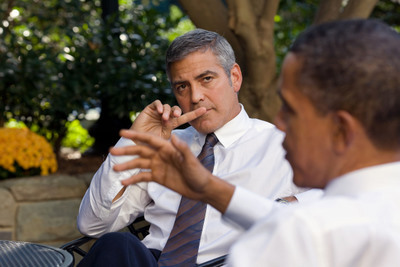
www.satsentinel.org/take_action
http://notonourwatchproject.org
http://sudanwatch.blogspot.com
Sudan (Listeni /suːˈdæn/), officially the Republic of Sudan, is a country in northeastern Africa. It is the largest country in Africa and the Arab world, and tenth largest in the world by area. The people of Sudan have a long history extending from antiquity which is intertwined with the history of Egypt, with which it was united politically over several periods. After gaining independence from Egypt and the United Kingdom in 1956, Sudan suffered 17 years of civil war followed by ethnic, religious and economic conflicts between the Northern Sudanese (with Arab and Nubian roots), and the Christian and animist Nilotes of Southern Sudan.This led to a second civil war in 1983, and due to continuing political and military struggles, Sudan was seized in a bloodless coup d’état by colonel Omar al-Bashir in 1989, who thereafter proclaimed himself President of Sudan.
Sudan then achieved great economic growth by implementing macroeconomic reforms and finally ended the civil war by adopting a new constitution in 2005 with rebel groups in the south, granting them limited autonomy to be followed by a referendum about independence in 2011. Rich in natural resources such as petroleum and crude oil, Sudan’s economy is currently amongst the fastest growing in the world. The People’s Republic of China and Japan are the main export partners of Sudan. Read More: > HERE <
Who we are – Our mission is to focus global attention and resources towards putting an end to mass atrocities around the world. Drawing upon the powerful voices of artists, activists, and cultural leaders, Not On Our Watch generates lifesaving humanitarian assistance and protection for the vulnerable, marginalized, and displaced. We encourage governing bodies to take meaningful, immediate action to protect those in harm’s way. Where governments remain complacent, Not On Our Watch is committed to stopping mass atrocities and giving voice to their victims. Founders: Don Cheadle, George Clooney, Matt Damon, Brad Pitt, David Pressman, Jerry Weintraub
A Message From George Clooney and John Prendergast – A new state is being born in Southern Sudan against a backdrop of decades of war between the South and North of Sudan. A peace deal in 2005 ended the latest round of open conflict, but the possibility of a return to war remains high as Southern Sudan prepares for independence.
One of the biggest risks in this dangerous moment is that an incident on the highly armed border could lead to wider conflict. The government in Khartoum has armed militias in contested bordering regions, the government air force has bombed border areas, and both sides have massed military units and equipment along the hottest border spots.
These areas have witnessed some of the most deadly conflict in the world since World War II. The former director of national intelligence says that Southern Sudan is the place in the world most likely to experience genocide.
We can’t allow another deadly war, and we surely cannot stand by in the face of a genocide threat.

Soon, the people of Southern Sudan will vote for independence, placing millions of civilians in the potential path of war. George Clooney and the Enough Project recently spent time in Sudan along the border between the north and south and saw what a return to war could look like. This video from the trip highlights the challenges Sudan faces as it works toward holding a peaceful referendum and avoiding a return to civil war. It’s not inevitable. We can stop this war before it starts. Visit www.SudanActionNow.org to find out more.
We were late to Rwanda. We were late to the Congo. We were late to Darfur. There is no time to wait. With your support, we will swiftly call the world to witness and respond. We aim to provide an ever more effective early-warning system: better, faster visual evidence and on-the-ground reporting of human rights concerns to facilitate better, faster responses.
This is why we have launched the Satellite Sentinel Project. There has never been a sustained effort to systematically monitor potential hot spots and threats to human security, in near real-time, with the aim of heading off humanitarian disaster and war crimes before they occur.
Previously, when mass atrocities occurred in Darfur, the Government of Sudan denied its involvement. Since photographers could not get access, it took years to amass evidence of genocide. But now we can witness in near real-time and put all parties on notice that if they commit war crimes, we will all be watching, and pressuring policymakers to take action.
We want to cast a spotlight – literally – on the hot spots along the border to record any actions that might escalate the chances of conflict. We hope that if many eyes are on the potential spoilers, we can all help detect, deter and interdict actions that could lead to a return to deadly violence. At the very least, if war crimes do occur, we’ll have plenty of evidence of the actions of the perpetrators to share with the International Criminal Court and the UN Security Council.
The world is watching because you are watching. This is our opportunity to prevent a war, to deter genocide. Make your voice heard. Click here to take action in support of peace in Sudan.
- www.looktothestars.org
- 10.01.11 VIDEO Kofi Annan speaks to the BBC in an interview about the Sudan referendum
- www.ourworldisnotforsale.org
- www.otherworldsarepossible.org
- Acacia Senegal – Sudan’s Miracle Commodity *
- Articles on Africa , Traditional Medicine
- Meet Sudan Action Now, friends, fans at fb <
- Meet Human Rights Watch, friends, fans at fb <
- Meet IFG Forum on Globalization, friends, fans at fb <
- Meet Global Witness, friends, fans at fb <
- Meet Alternative Energy News, studies, friends, fans at fb <
- Meet UN Millenium Goals, studies, friends, fans at fb <
- Meet World Fair Trade Organization, friends, fans at fb <
- Meet UNHCR Refugee Agency, friends at fb <
Yoga of Himalayas – Nuns & Communities
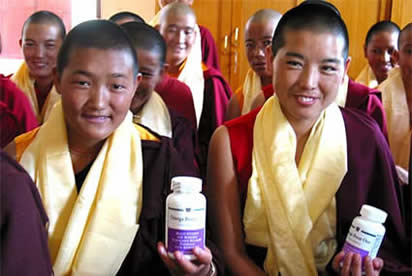
www.muktinath.org Chumig Gyatsa
Nepal (नेपाल) (/nɛˈpɔːl/ Nepali: नेपाल ), officially the Federal Democratic Republic of Nepal, is a landlocked country in South Asia. It is located in the Himalayas and bordered to the north by the People’s Republic of China, and to the south, east, and west by the Republic of India. With an area of 147,181 square kilometres (56,827 sq mi) and a population of approximately 30 million, Nepal is the world’s 93rd largest country by land mass and the 41st most populous country. Kathmandu is the nation’s capital and the country’s largest metropolis. Nepal has a rich geography. The mountainous north has eight of the world’s ten tallest mountains, including the highest point on Earth, Mount Everest, called Sagarmatha in Nepali. It contains more than 240 peaks over 20,000 ft (6,096 m) above sea level. The fertile and humid south is heavily urbanized. Read More: > HERE <
The Tibetan Nuns Project is a non-profit organization dedicated to educating and supporting nuns in India from all Tibetan Buddhist lineages. It supports nuns interesting in study and higher ordination. Tibetan nunneries have historically been well established in Tibet, certainly from the 12th century and with traditions reaching back as far as the eighth century. Before the Chinese invasion in 1949, there were at least 818 nunneries and nearly 28,000 nuns living in Tibet. Traditional education in the nunneries included reading, writing, and lessons in ancient scriptures and prayers taught by the senior nuns or lamas from monasteries. Read More: > HERE <
The vision behind the Pundarika lotus symbol is the immaculate wisdom and compassion of Dharma. It is Pundarika’s hope to manifest this vision by bringing the timeless wisdom of great Tibetan masters to the modern West.
Under the guidance of Tsoknyi Rinpoche, Pundarika Foundation was established in 1994 as a 501(c)(3) nonprofit religious organization and as a 501(c)(3) church in 2006 (FEIN No. 84-1295990). Pundarika is a volunteer organization that relies on the generosity of students’ time and commitment. It has the support of over 2,000 students throughout the world who attend retreats, practice Dharma under the inspiration of Rinpoche and contribute time, money and prayers to its success.
Missions and Goals: „You can awaken a sense of responsibility for all the other sentient beings who are exactly the way you used to be, tormented by negative emotions. You can begin helping them–first one, then two, then three and finally all sentient beings.“ Tsoknyi Rinpoche
Pundarika Foundation’s primary mission is to support the teaching activities and humanitarian work of Tsoknyi Rinpoche by: Keeping alive the wisdom of the Dharma, Sustaining practitioners who preserve the teachings of the Buddha as a vital tradition, Helping people experience inner peace, to better face the challenges of modern life with compassion and sanity, ~For Recent Accomplishments, please click here ~

Produced by Chariot Videos – www.chariotvideos.com . Blessings tells the story of 3000 nuns living in the remote nomadic region of Nangchen in Eastern Tibet who practice an ancient yogic tradition of Tibetan Buddhism. Despite near extinction during the destruction of the Cultural Revolution, these remarkable practitioners have emerged to rebuild their monasteries by hand.. stone by stone. Now, their wisdom tradition is once again vital and growing. In 2005, Tsoknyi Rinpoche III led a small group of western students to meet these amazing women. Narrated by Richard Gere www.gerefoundation.org/, with music by Ani Choying Drolma and Steve Tibbetts, Blessings is the story of this extraordinary journey.
Rinpoche’s first visit to Chumig Gyatsa led to the immediate construction of 10 small rooms. Since then, their nunnery has been repaired and enlarged, and the nuns were able to perform a full Buddhist ritual practice for the first time. Twenty young girls were ordained and joined the community. Today, the 51 nuns divide their time between Kathmandu and Muktinath. Also, a health clinic (Chumig Gyatsa Gargon Abbey and Clinic) was constructed that serves the nuns and the local community. This year, a new large shrine hall is being constructed.
Ancient practices leading to enlightenment – The nuns’ story is a classic example of dedication and tenacity. Organized in nunneries comprised of several “Ani houses” (dwellings where up to 15 nuns live together), they perform their spiritual practices in a group, teaching and helping each other all their lives. Many nuns do three-year, nine-year or even lifetime retreat. On retreat, each nun sits all day in meditation posture doing her yogic practices and meditation.
The nuns’ daily routine captures a timeless scene from the past. A typical day starts around 3:30 a.m., as the nuns wake and immediately start their first three-hour practice session. After a short break for breakfast, they resume their second session, ending at lunch. The third session occupies the afternoon, and after a light evening meal, they complete their fourth practice session. They then continue sitting throughout the night, practicing dream yoga.
Many of the nuns are accomplished masters of difficult yogic practices such as tummo (the yoga of inner heat). They perform yearly rituals for the public that include a long procession around the center in the dead of winter in sub-zero temperatures, with only a sheet wrapped around their bodies. During the night, hundreds of the most adept nuns wet their sheets repeatedly in buckets of melted snow and continue their procession, drying the sheets again and again with the inner heat generated by their yogic practice.
This very rare and awe-inspiring event, as well as the realization of the elder nuns, has gained them respect and renown throughout Tibet. In a culture where female practitioners have struggled to gain respect, these nuns have risen to a high level of status, with many monks and lamas seeking their teachings and instruction.

* Tsoknyi Nangchen Nun at Gebchak Gonpa *
The nuns also serve the community through spiritual support and counseling, giving love, compassion and emanating peace directly into people’s minds. This is a tangible example of the power of spiritual influence.
„Love and compassion are necessities, not luxuries. Without them humanity cannot survive.“ ~ H. H. the Dalai Lama
The values that nuns have—peace, love and compassion—affect an entire community and continue to branch out to the rest of the world. In summary, the nuns‘ lives exemplify the power of living Dharma and its realization to transform the hearts and minds of the surrounding communities.
- www.developmentwatch.net
- www.minesandcommunities.org http://stopminingtibet.com
- http://amuletforums.com/archive/offering-15-000-sangha-t2686.html
- Meet Tibetan Nuns Project, studies, friends, fans at fb <
- Meet International Ecotourism Society, fans at fb <
- Meet International Impact Assessment IAIA at fb <
- Meet Book of Tibetan Medicine at fb <
- Meet Human Rights Watch, friends, fans at fb <
- Meet UNESCO World Heritage, friends, fans at fb <
- Meet Millenium Goals friends, fans at fb < www.endpoverty2015.org
Mountain Minorities and Indigenous Peoples

NGO Development Projects Active in Tibet
About ICIMOD – The International Centre for Integrated Mountain Development, ICIMOD, is a regional knowledge development and learning centre serving the eight regional member countries of the Hindu Kush-Himalayas – Afghanistan, Bangladesh, Bhutan, China, India, Myanmar, Nepal, and Pakistan – and based in Kathmandu, Nepal.
Globalisation and climate change have an increasing influence on the stability of fragile mountain ecosystems and the livelihoods of mountain people. ICIMOD aims to assist mountain people to understand these changes, adapt to them, and make the most of new opportunities, while addressing upstream-downstream issues. We support regional transboundary programmes through partnership with regional partner institutions, facilitate the exchange of experience, and serve as a regional knowledge hub. We strengthen networking among regional and global centres of excellence. Overall, we are working to develop an economically and environmentally sound mountain ecosystem to improve the living standards of mountain populations and to sustain vital ecosystem services for the billions of people living downstream – now, and for the future.
International Mountain Day, celebrated on December 11, gives us an opportunity to reflect on the relevance of mountains for the world. This year the International Mountain Day theme focuses on indigenous peoples and other minorities living in the mountains. The purpose is both to highlight the threats and challenges faced by these communities, and to acknowledge the invaluable knowledge they have and the contributions they can make towards overcoming global challenges of poverty and loss of diversity in a rapidly changing world.
A majority of the world’s indigenous women and men live in mountain regions, many on the margins of society and facing poverty and exclusion. The Hindu Kush-Himalayan region has some of the highest diversity of indigenous peoples and other minorities in the world. An ICIMOD report identified more than 600 living languages in the Himalayas, 400 spoken by less than 100,000 people. According to current forecasts, ninety per cent of all languages could disappear within 100 years. The loss of these languages not only erodes an essential component of a group’s identity, it is also a loss to heritage for all humankind.
The UN General Assembly adopted the UN Declaration on the Rights of Indigenous Peoples in September 2007, marking an important step in international efforts to preserve the identity of indigenous peoples. However, implementation has a different speed and different levels of commitment in different countries.
In agricultural terms, mountains are often considered ‘marginal lands’, unsuitable for modern commercial farming which focuses on cultivation of single crop varieties for large markets. Indigenous mountain people and other mountain communities continue to use traditional practices and techniques including sophisticated terracing systems, water transportation and irrigation schemes, and a combination of pasture, forestry and farming practices. Indigenous women and men serve as custodians of this traditional knowledge on how to farm under difficult mountain conditions, and how to conserve important reservoirs of agricultural biodiversity.
They sustainably farm a wide variety of crops that are adapted to a range of different elevations, slope conditions, and micro-climates, and this knowledge will be of great, if as yet little noticed, value in the world’s efforts to adapt to climate and other drivers of change. The autonomous adaptation practiced by mountain communities consists of community-based interventions that address underlying causes of vulnerability and reduce the risk of possible adverse impacts of climate change by building upon the existing rich indigenous knowledge base on adaptation to environmental change and helping to strengthen the resilience of the communities. Women especially play a critical role in gendered indigenous knowledge. Their roles and expertise have yet to be acknowledged, but has great potential for adapting to multiple drivers of change.
Indigenous mountain communities are connected to the land, the environment, and natural resources in ways that are often inextricably intertwined and therefore expressed in spiritual and socio-cultural terms. Respecting this worldview, and preserving the languages, music, artwork, folk tales, culture, meanings, and myths that express it, is critical for the survival of indigenous communities in mountain areas. This ‘intangible heritage’ also enriches the global community, providing inspiration and insights for realising a more sustainable relationship between humankind and the environment.
A scene from Tibetan Documentary „Leaving Fear Behind,“ shows a nomad school in Tibet (Amdo) working to preserve Tibetan Language and culture as it’s very existence is under threat from Chinese Government policies. Find out more: http://studentsforafreetibet.org Leaving Fear Behind: The Film the Chinese Government Doesn’t Want the World to See. // sumit sadhak practicing handstand in himalyas on the bank of ganga river one of the most important places for yogis.
The involvement of indigenous mountain communities is an important prerequisite for sustainable mountain development. Therefore, as governments work toward addressing mountain development priorities, it is critical that they live up to their commitments outlined in the UN Declaration on the Rights of Indigenous Peoples.
We hope that this year’s International Mountain Day will help to increase awareness of the central role of Minorities and Indigenous Peoples for mountain development, and to motivate all citizens, policy makers, and development actors to recognise the importance of their contribution to sustainable development. We trust that the Day will encourage organisations to invite indigenous and traditional mountain communities to participate actively in national and international efforts to understand and adapt to the multiple drivers of change, including climate change, in the mountains of the world.
With best wishes, Andreas Schild http://www.icimod.org
Culture and Development – Placing culture at the heart of development policy constitutes an essential investment in the world’s future and a pre-condition to successful globalization processes that take into account the principles of cultural diversity. It is UNESCO’s mission to remind all States of this major issue.
As demonstrated by the failure of certain projects underway since the 1970s, development is not synonymous with economic growth alone. It is a means to achieve a more satisfactory intellectual, emotional, moral and spiritual existence. As such, development is inseparable from culture. Strengthening the contribution of culture to sustainable development is a goal that was launched in connection with the World Decade for Cultural Development (1988-1998). Ever since, progress has been made thanks to a corpus of standard-setting instruments and demonstration tools such as cultural statistics, inventories, regional and national mapping of cultural resources.
In this regard, the major challenge is to convince political decision-makers and local, national and international social actors to integrating the principles of cultural diversity and the values of cultural pluralism into all public policies, mechanisms and practices, particularly through public/private partnerships.
This strategy will aim, on the one hand, at incorporating culture into all development policies, be they related to education, science, communication, health, environment or tourism and, on the other hand, at supporting the development of the cultural sector through creative industries. By contributing in this way to poverty alleviation, culture offers important benefits in terms of social cohesion. Read more: http://portal.unesco.org/culture/en
The Challenge of Human Rights and Cultural Diversity – United Nations Background Note by Diana Ayton-Shenker:
The end of the cold war has created a series of tentative attempts to define „a new world order“. So far, the only certainty is that the international community has entered a period of tremendous global transition that, at least for the time being, has created more social problems than solutions.
The end of super-power rivalry, and the growing North/South disparity in wealth and access to resources, coincide with an alarming increase in violence, poverty and unemployment, homelessness, displaced persons and the erosion of environmental stability. The world has also witnessed one of the most severe global economic recessions since the Great Depression of the 1930s.
At the same time, previously isolated peoples are being brought together voluntarily and involuntarily by the increasing integration of markets, the emergence of new regional political alliances, and remarkable advances in telecommunications, biotechnology and transportation that have prompted unprecedented demographic shifts.
The resulting confluence of peoples and cultures is an increasingly global, multicultural world brimming with tension, confusion and conflict in the process of its adjustment to pluralism. There is an understandable urge to return to old conventions, traditional cultures, fundamental values, and the familiar, seemingly secure, sense of one’s identity. Without a secure sense of identity amidst the turmoil of transition, people may resort to isolationism, ethnocentricism and intolerance.
This climate of change and acute vulnerability raises new challenges to our ongoing pursuit of universal human rights. How can human rights be reconciled with the clash of cultures that has come to characterize our time? Cultural background is one of the primary sources of identity. It is the source for a great deal of self-definition, expression, and sense of group belonging. As cultures interact and intermix, cultural identities change. This process can be enriching, but disorienting. The current insecurity of cultural identity reflects fundamental changes in how we define and express who we are today. Read More: * HERE*
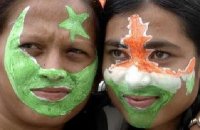
Skate Aid & Green Helmets in Afghanistan
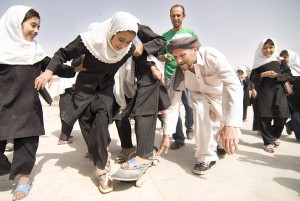
Der Grünhelme e. V. ist eine deutsche Hilfsorganisation mit Sitz in Köln. Der Verein wurde im April 2003 auf Initiative von Rupert Neudeck und Aiman Mazyek mit der Idee gegründet, ein „Peace Corps“ aufzustellen, wie es der US-Präsident John F. Kennedy bereits in den 1960er Jahren initiieren wollte. Vorsitzender ist der bekannte Flüchtlingshelfer Rupert Neudeck. Anfang 2010 trat auch Peter Scholl-Latour dem Kuratorium bei und fungiert als Berater. Politisch neutral, sowie nationalitäts- und religionsübergreifend setzen sich die Grünhelme besonders für den Bau und Wiederaufbau von sozialen, ökologischen, kulturellen und religiösen Einrichtungen in ehemaligen Kriegs- und Krisengebieten ein. Betont wird dabei die Begegnung, der christlich-islamische Dialog und die Zusammenarbeit von Christen und Muslimen. Read More: > HERE<
The Islamic Republic of Afghanistan, commonly known as Afghanistan, is a landlocked and mountainous country in south-central Asia.It is bordered by Pakistan in the south and east,[note] Iran in the west, Turkmenistan, Uzbekistan and Tajikistan in the north, and China in the far northeast. The territories now comprising Afghanistan have been an ancient focal point of the Silk Road and human migration. Archaeologists have found evidence of human habitation from as far back as 50,000 BCE. Urban civilization may have begun in the area as early as 3,000 to 2,000 BC. Read More: > HERE <
The Titus Dittmann Foundation – For more than 30 years now, for us everything revolves around skateboarding. From the beginning we recognized the enormous power of the skateboard. Skateboarding knows no frontiers and wars, colour of skin or hate, rich or poor: Skateboarding unites and promotes a sense of identity and purpose especially in the development of young people. From early days we have promoted national and international skateboard-projects. In 2008, when we supported an initiative in Kabul I came to realize once more how ideally instrumental skateboarding is in overcoming differences in areas of conflict. After my first visit to Afghanistan, it was clear to me: I need to stay with it to achieve even more.
In January 2010 I established the Titus Dittmann Foundation. With the skate-aid initiative we utilize the power of skateboarding and our entire potential to bring hope on four wheels to young people, whether in Afghanistan, Africa or with the continuing work in Germany. Please help us, we rely on your support to achieve our aim and bring a share of happiness and security to children who have been deprived of their childhood. I thank you for your interest and hope you can help to promote this project with any contribution you can make. Sincerely Yours, Titus Dittmann
Help Across the board, the means to an end: * Fundraising for the individual projects* Collecting skateboards and gear for free distribution to the various initiatives* Gathering and utilizing know-how, manpower and contacts to the skateboard, media and business world* Public relations, lobbying and information services
With skate-aid, under the umbrella of the Titus Dittmann Foundation, we support humanitarian aid projects for children and young people worldwide through skateboarding to promote a sense of identity and purpose.
The supported projects:* Grünhelme* Sentinel Boardriders* Skateistan* Society Of Skating* CV-Afrika-Hilfe e.V.* Skaters Palace* Hai Duong Kinderheim* Don Bosco* MylifE
http://www.youtube.com/user/skateaidorg , www.chomsky.info
Avram Noam Chomsky is an American linguist, philosopher,cognitive scientist, and political activist. He is an Institute Professor and professor emeritus of linguistics at the Massachusetts Institute of Technology. Chomsky is well known in the academic and scientific community as one of the fathers of modern linguistics, and a major figure of analytic philosophy. Read More: > HERE <
The organization GRUENHELME e.V. (GREEN HELMETS) was founded in Germany in April 2003. The association is working as a humanitarian agency and consists of nine members. The executive Committee consists of Dr. Rupert Neudeck as chairman (Neudeck was founder of the NGO Cap Anamur), Aiman Mazyek (spokesman of the Central Committee of Mulims) and Josef Grundner (a logistician and specialist in houses and school construction who worked several in Kosovo and Afghanistan on humanitarian base).
The association is supported by several well-known personalities in Germany, such as Wolfgang Thierse – President of the German Parliament, Prof. Amin Farhang – Minister for Reconstruction in Afghanistan, Dr. Norbert Bluem – former Minister of Labor, Hans-Juergen Wischnewski – ex-Minister of State, Prof. Barbara John – Responsible for Affairs of Foreigners in Berlin, Marieluise Beck – Parliamentary Secretary of State.
The dialogue between different religions and cultures is not new. There is no lack of conferences, summit meetings, papers and good intentions. But what is missing is the aim to transfer these intentions into real actions. Our main interest is the reconstruction of villages, schools and ambulances in destroyed regions. We always collaborate with the local population. We want to revive John F. Kennedys idea of a Peace Corps and we aim to unite young christian and muslim Germans as well as other people with the same understanding and the intention to work together and create something.
Current projects Irak: In the slums of Bagdad (Shishan), a school was built for 2,100 children. The inauguration of the schools took place on September 30th 2003; children and teachers had been waiting impatiently for that moment. Northern Irak: Since October 15th 2003, a team has been at Zurnaj in the district of Makhmoor south of Erbil. 60 houses, once destroyed under the regime of Saddam Hussein, are now reconstructed. Two schools are being built, one for the Kurdish and one for the Arab population. During the current crisis, the projekt had to be interrupted for two weeks.
Afghanistan: In Totechi (engl. “the flutist”), a village of 369 families, two schools for boys and girls were built. At the same time, the 750 pupils undertook to plant one tree respectively as a sign against erosion. On March 5th 2004, the first stone for the next school in Talab was set, with the governor of Herat Ismael Khan and the German consul Dr. Axel Weishaupt present. In Sang Kutal a school for 750 pupils is being constructed, in Siad Kamarak a school for 800 pupils. Besides, in Totechi, a workshop for joiners has been established, the next workshop will be set up in Qarabagh; young craftsmen are trained here. A gynaecologal ward is planned. One school for up to 1000 pupils costs about 45,000 Euro. We are searching for staff who are able to work in practice and who are willing to radically invest three months of their lifetime. We are not looking for dreamers, each staff member has to be psychologically and physically stable and must be able to bear the challenges of the work! The commitment does not involve any expenses, but there is no working contract or salary either. The association only pays for the flight, acommodation and catering in the project (no single rooms), insurance and a monthly pocket-money of 100 Euro. At the moment, eight staff from Germany are working in the projects together with numerous local people.
Our bank account no is 20 00 008 at Deutsche Bank München, bank code: 700 700 24 All donators that indicate their full address get a receipt.
(mehr …)
Build Hope – Sivananda Sevashram
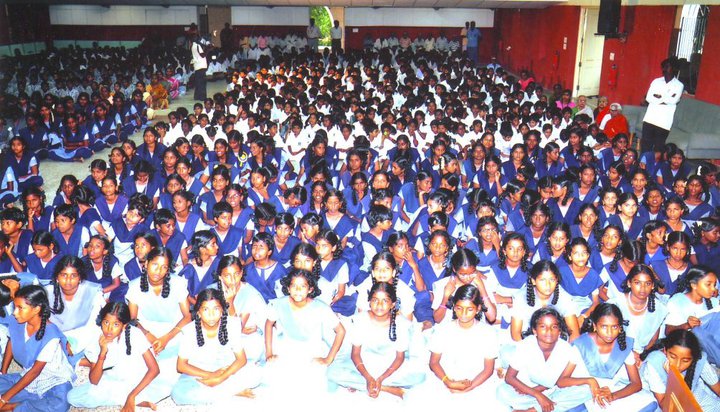
SERVE, LOVE, GIVE, PURIFY, MEDITATE, REALISE. So Says Sri Swami Sivananda Saraswati Maharaj
Swami Sivananda Saraswati (September 8, 1887—July 14, 1963) was a Hindu spiritual teacher and a well known proponent of Yoga and Vedanta. Sivananda was born Kuppuswami in Pattamadai, in the Tirunelveli district of Tamil Nadu. He studied medicine and served in Malaya as a physician for several years before taking up monasticism. He lived most of the later part of his life near Muni Ki Reti, Rishikesh. He is the founder of The Divine Life Society (1936), Yoga-Vedanta Forest Academy (1948) and author of over 200 books on yoga, vedanta and a variety of other subjects. He established Sivananda Ashram, the location of the headquarters of The Divine Life Society (DLS), on the bank of the Ganges at Shivanandanagar, at a distance of 3 kilometres from Rishikesh.
Sivananda Yoga, the yoga form propagated by him, are now spread in many parts of the world through Sivananda Yoga Vedanta Centres, but these centres are not affiliated with Swami Sivananda’s original ashrams which are run by the Divine Life Society. Read More: > HERE <
His Holiness Swami Sivananda was born in Pathamadai in Thirunelveli district, South India. Ever since his childhood, His Holiness was totally devoted to serving others. He worked very hard and graduated in Medicine. As a doctor he earned money but could not obtain peace of mind. He realized that earning a lot of money does not mean earning peace and happiness. Instead, spiritualism alone can help one attain MUKTHI or MOKSHA. His mind was in search of peace and was in a quest for the ultimate purpose of being born in this world. He felt that everyone must have a goal in life and one must lead one’s life with purpose and meaning.
Swami Sivananda proceeded to Rishikesh in North India, where he realized his goal while sitting on the banks of Ganges. He advocated non-violence, truth and worship. Many were impressed by his simplicity and teachings. He gathered a lot of followers and in due course, a mission was started in a small hut which today proudly stands as SWAMI SIVANANDA SARASWATHI SEVASHRAM at Rishikesh. His teachings were simple and he saw God as Omnipotent. He advocated the principle that „ONE CAN FIND GOD IN HIS/HER OWN HEART BY BEING HONEST AND LEADING A SIMPLE LIFE“. He believed the teachings of the Quran, Bhagavath Gita and Bible to be the same. He also believed that there was no need for one to go in search of God, as one can find God in their own hearts by not being selfish, but by making sacrifices for others. Many devotees all around the world were fascinated by his teachings and started several missions in Yoga, Siddha and other spiritual awakenings.The late founders of Sivananda Ashram, Sri S. V. Iyer and Dr. V. Mangalam, started this organization after being enlightened by Swamiji that the only real happiness a human being could find was by serving others.
We hope Swamiji’s teachings inspire and motivate all of us to do what we can to help others lead a better life.
Shri. S. V. Iyer and Dr. V. Mangalam, an elderly couple, started Sivananda Saraswathi Sevashram in 1945 with just 3 kids and with the blessings of Swami Sivananda of Rishikesh. More popularly known as „Sivananda Ashram/Orphanage/Gurukulam“, the organization has grown to be a very well known and well recognized social institution in the country today.
We are a „National Awardee“ institution recognized by the Government of India in 1983.
Sivananda Saraswathi Sevashram is a non-profit organization with the primary objective of protecting orphans, destitute women, the physically handicapped, AIDS-affected children, and the elderly.
With the experience of more than 60 years of recorded services to thousands of poor orphans, Sivananda Orphanage effectively helps transform/grow these orphans to productive citizens. We not only provide food, education and shelter, but also instill character and morals to help them grow, learn and eventually become independent.
Many, including former Prime Minister of India, Shri Pandit Jawaharlal Nehru have visited our ashram and witnessed our committed work. We currently look after 300 children and 80 elderly, all of whom are accepted and cared for with love and affection.
Burma Schools, Medicine, Sound & Travel
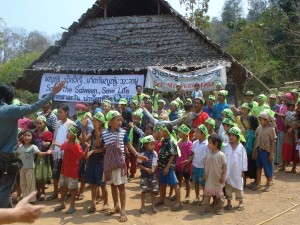
Karen children sing in honor of rivers: www.internationalrivers.org
BURMESE MIGRANT EDUCATION COMITEE
Burma, officially the Union of Myanmar, is the largest country by geographical area in Indochina (mainland Southeast Asia). The country is bordered by China on the north-east, Laos on the east, Thailand on the south-east, Bangladesh on the west, India on the north-west and the Bay of Bengal to the south-west with the Andaman Sea defining its southern periphery. One-third of Burma’s total perimeter, 1,930 kilometres (1,199 mi), forms an uninterrupted coastline. Read More: > HERE <
PRISONED NOBEL LAUREATES: Aung San Suu Kyi , born 19 June 1945) is a Burmese opposition politician and a former General Secretary of the National League for Democracy. She has remained under house arrest in Myanmar for almost 14 out of the past 20 years. Aung San Suu Kyi was the recipient of the Rafto Prize and the Sakharov Prize for Freedom of Thought in 1990 and the Nobel Peace Prize in 1991. In 1992 she was awarded the Jawaharlal Nehru Award for International Understanding by the Government of India. Read More: > Here <
Liu Xiaobo (pronunciation: [ljǒʊ̯ ɕjɑ̀ʊ̯pɔ́]; born 28 December 1955) is a Chinese literary critic, professor, and human rights activist who called for democratic reforms and the end of one-party rule in China. He is currently incarcerated as a political prisoner in China. During his 4th prison term, he was awarded the 2010 Nobel Peace Prize, for „his long and non-violent struggle for fundamental human rights in China. Read More: > HERE <
The Karen Teacher Working Group (KTWG) is a local Karen organization attempting to promote education throughout Karen State, Burma despite almost 60 years of Burma Army oppression.
You can find regularly updated news about Karen communities in refugee camps in Thailand and in internally displaced communities throughout Karen State, Burma – as well as news about schools in those communities. You can also find reports, newsletters, Karen fonts, and other resources on our site. Donations for Karen State schools may also be made online or by contacting us. For over half a century, civil war in Burma has uprooted many Ethnic, Indigenous communities. The Burmese military regime (SPDC) have focused their military offensives upon Ethnic groups living in the border areas of Burma . Numerous Ethnic Peoples have fled Burma to escape forced labour, re-location, rape, murder, theft and many other human rights abuses.
The Karen are one of the Ethnic groups from Burma . There are over 120,000 Karen living in refugee camps in Thailand . The majority of Karen live in Karen State, Burma where they continue to suffer greatly at the hands of the Burmese military regime (SPDC). There are over 100,000 internally displaced Karen persons living in Karen State, Burma.
AUNG SAN SUU KYI – Nobel Peace Prize Winner on Non Violence
Nobel Peace prize winners (Archbishop Desmond Tutu, The Dalai Lama, Shirin Ebadi, Adolfo Pérez Esquivel, Mairead Corrigan, Rigoberta Menchú, Prof. Elie Wiesel, U.S. President Barack Obama, Betty Williams, Jody Williams and former U.S. President Jimmy Carter) have called for the rulers of Burma to release Suu Kyi „create the necessary conditions for a genuine dialogue with Daw Aung San Suu Kyi and all concerned parties and ethnic groups in order to achieve an inclusive national reconciliation with the direct support of the United Nations.“
The Mae Tao Clinic (MTC), founded and directed by Dr. Cynthia Maung, provides free health care for refugees, migrant workers, and other individuals who cross the border from Burma to Thailand. People of all ethnicities and religions are welcome at the Clinic. Its origins go back to the student pro-democracy movement in Burma in 1988 and the brutal repression by the Burmese regime of that movement. The fleeing students who needed medical attention were attended in a small house in Mae Sot. Located on the border in Mae Sot, people of all ethnicities and religions are welcome at the Clinic.
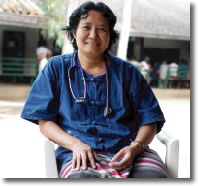
Since 1989 the Mae Tao Clinic has grown, from that one small house to a large complex of simple buildings that provide a wide variety of health services to different groups of people. Today it serves a target population of approximately 150,000 on the Thai-Burma border. Exact numbers are hard to calculate because of the fluidity of the population. About 50% of those who come to MTC for medical attention are migrant workers in the Mae Sot area; the other 50% travel cross-border from Burma for care.
Mae Tao Clinic Objectives: To provide health services for displaced Burmese populations along the Thailand-Burma border, initial training of health workers and subsequent corollary medical education, strengthen health information systems along the border, improve health, knowledge, attitudes, and practices within local Burmese populations, promote collaboration among local ethnic health organizations, strengthen networking and partnering with international health professionals and institutions.
The Nobel Women’s Initiative was established in 2006 by sister Nobel Peace Laureates Jody Williams, Shirin Ebadi, Wangari Maathai, Rigoberta Menchú Tum, Betty Williams and Mairead Corrigan Maguire. We six women — representing North and South America, Europe, the Middle East and Africa — decided to bring together our extraordinary experiences in a united effort for peace with justice and equality. Only 12 women in its more than 100 year history have been recognized with the Nobel Peace Prize. The Nobel Peace Prize is a great honor, but it is also a great responsibility. It is this sense of responsibility that compelled us to create the Nobel Women’s Initiative to help strengthen work being done in support of women’s rights around the world – work often carried out in the shadows with little recognition.
www.tutu.org Archbishop Tutu´s Birthday wishes to Aung San Suu Kyi
We believe peace is much more than the absence of armed conflict. Peace is the commitment to equality and justice; a democratic world free of physical, economic, cultural, political, religious, sexual and environmental violence and the constant threat of these forms of violence against women indeed against all of humanity.
The Vision of the Nobel Women’s Initiative is a world transformed, a nonviolent world of security, equality and well-being for all. It is the heartfelt mission of the Nobel Women’s Initiative to work together as women Nobel Peace Prize Laureates to use the visibility and prestige of the Nobel prize to promote, spotlight, and amplify the work of women’s rights activists, researchers, and organizations worldwide addressing the root causes of violence, in a way that strengthens and expands the global movement to advance nonviolence, peace, justice and equality. We accomplish this mission through three main strategies: convening, shaping the conversation, and spotlighting and promoting.
- www.nobelwomensinitiative.org
- Meet Free Liu Xiaobo, friends, fans at facebook <
- Meet International Rivers, friends, fans at facebook <
- Meet COP16, friends, fans, at facebook <
3rd Annual Atlanta Tibetan Festival
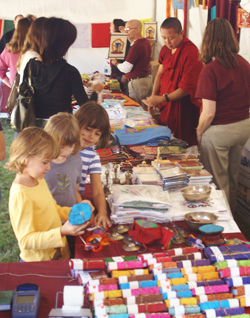
Drepung Monastery (wylie: ‚bras spungs dgon),(literally “Rice Heap” monastery), located at the foot of Mount Gephel, is one of the „great three“ Gelukpa university monasteries of Tibet. The other two are Ganden and Sera. Drepung is the largest of all Tibetan monasteries and is located on the Gambo Utse mountain, 5 kilometers from the western suburb of Lhasa. Freddie Spencer Chapman reported, after his 1936-37 trip to Tibet, that Drepung was at that time the largest monastery in the world, and housed 7,700 monks, „but sometimes as many as 10,000 monks.“ Read More: > Here <
The Gelug or Gelug-pa (or dGe Lugs Pa, dge-lugs-pa, or Dgelugspa), also known as the Yellow Hat sect, is a school of Buddhism founded by Tsongkhapa (1357–1419), a philosopher and Tibetan religious leader. The first monastery he established was at Ganden, and to this day the Ganden Tripa is the nominal head of the school, though its most influential figure is the Dalai Lama. Read more: > HERE <
Emory University is a private research university located in the metropolitan Atlanta area of Druid Hills, Georgia. The university was founded as Emory College in 1836 in Oxford, Georgia by a small group of Methodists and was named in honor of John Emory, a well-known Methodist bishop. Read More: > HERE <
Since His Holiness the Dalai Lama blessed our center in 2007, Drepung Loseling has been working towards completing its vision of creating a “Little Tibet” in Atlanta. Last year’s Tibetan Festival was voted by the Atlanta Journal Constitution as “The Top Thing to do”. Hundreds of visitors have enjoyed the last two festivals and we promise this year’s program will be just as fun.
Bring your family and friends to this special celebration of Tibetan culture. Activities include meditation, Tibetan food, music, dance, games, a Tibetan Bazaar, children’s arts and crafts, door prizes, a raffle and a live performance and workshop presented by the monks of the Mystical Arts of Tibet.
3rd Annual Atlanta Tibetan Festival
Saturday, November 6, 2010 – 10 am to 4 pm
Come and join us for our annual Tibetan Festival. There will be Tibetan food, music and dance, a Tibetan market along with guided meditation and games for the children.
The Mission of Drepung Loseling – Following the legacy of Drepung Loseling Monastery, India, and with the patronage of His Holiness the Dalai Lama, Drepung Loseling is dedicated to the study and preservation of the Tibetan Buddhist tradition of wisdom and compassion. A center for the cultivation of both heart and intellect, it provides a sanctuary for the nurturance of inner peace and kindness, community understanding, and global healing.
In implementing this vision, Drepung Loseling has two main objectives: To contribute to North American culture by providing theoretical knowledge and practical training in Tibetan Buddhist scholarly traditions for Western students, scholars and the general public; and To help preserve the endangered Tibetan culture, which today leads a fragile existence in the exiled refugee communities in India and Nepal.
Sponsor A Monk – The Drepung Loseling Educational Fund was established in 1988 to preserve traditional Tibetan culture by sponsoring a monk in training at Drepung Loseling.
Over half of our population is comprised of recent refugees whose parents remain in Chinese occupied Tibet; therefore, they cannot provide them with support. We also have a number of young monks who are orphans.
The Drepung Loseling Educational Fund was established in 1988 to preserve traditional Tibetan culture by sponsoring a monk in training at Drepung Loseling. Conditions in the Tibetan refugee camps in India are basic, and the average family is poor.
Young monks born in India have little parental support, and depend almost entirely upon the production of our small farm. Over half of our population is comprised of recent refugees whose parents remain in Chinese occupied Tibet; therefore, they cannot provide them with support. We also have a number of young monks who are orphans.
The Monastery accepts all sincere candidates regardless of their financial situation and must support them by means of the proceeds of the same small parcel of land provided to the original 216 Loseling refugee monks. The Fund helps provide for the basic needs of food, health care and education for these monks.
His Holiness formally accepts professorship: His Holiness the XIV Dalai Lama serves as Presidential Distinguished Professor, the first university appointment accepted by the 1989 Nobel Peace Laureate and leader of the Tibetan people. This appointment gives students unique access to His Holiness, his teachings and his insights. The Emory-Tibet Partnership raises awareness of Emory University as a leading center of study of Tibetan philosophy and religion in the West with both Western-trained and traditionally trained scholars.
The Affiliation with Emory University – The May 1998 visit of His Holiness the Dalai Lama marked the historic culmination of three years of dialogue and planning. While visiting Emory University in 1995, he was approached by a faculty delegation to discuss the prospects of an affiliation between Drepung Loseling Monastery and Emory University. In response to his positive interest, the affiliation process was initiated. During these discussions it was decided that the best infrastructure for this arrangement would be a direct affiliation of Emory University with Drepung Loseling Monastery in India, as well as with Drepung Loseling, Drepung’s North American seat. This would allow Drepung Loseling to design various programs both in North America and in India for academic accreditation through Emory. With this precedent-setting partnership, Drepung Loseling provides a unique link between the resources and faculty of a major American university and principal scholastic Tibetan monastery-in-exile in India.
Benares Gharana Music Concerts Austria
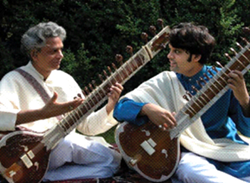
Varanasi (Sanskrit: वाराणसी VÄ�rÄ�ṇasÄ�)is a city situated on the banks of the River Ganges in the Indian state of Uttar Pradesh, 320 kilometres (199 mi) southeast of state capital Lucknow. It is regarded as a holy city by Buddhists and Jains, and is the holiest place in the world in Hinduism (and center of earth in Hindu Cosmology). It is one of the oldest continuously inhabited cities in the world and probably the oldest of India. The Kashi Naresh (Maharaja of Kashi) is the chief cultural patron of Varanasi and an essential part of all religious celebrations.The culture of Varanasi is closely associated with the River Ganges and the river’s religious importance. The city has been a cultural and religious centre in North India for several thousand years.
The Benares Gharana form of Indian classical music developed in Varanasi, and many prominent Indian philosophers, poets, writers, and musicians resided or reside in Varanasi, including Kabir, Ravidas Their Guru Swami Ramanand, Trailanga Swami, Munshi Premchand, Jaishankar Prasad, Acharya Shukla, Ravi Shankar, Girija Devi, Hariprasad Chaurasia, and Bismillah Khan. Tulsidas wrote Ramacharitamanas here, and Gautama Buddha gave his first sermon at Sarnath located near Varanasi (Kashi). Varanasi is home to four universities: Banaras Hindu University, Mahatma Gandhi Kashi Vidyapeeth, Central Institute of Higher Tibetan Studies and Sampurnanand Sanskrit University. Residents mainly speak Hindi and Kashika Bhojpuri, which is closely related to the Hindi language. People often refer to Varanasi as „the city of temples“, „the holy city of India“, „the religious capital of India“, „the city of lights“, and „the city of learning.“ Read More: > HERE <
Seit mittlerweile sieben Generation musizieren Vater und Sohn der Mishra Familie – Pandit Shivanth und Deobrat Mishra – gemeinsam. Music of Benares bringen mit Ihrer Musik den Zauber der mehr als 2000 Jahre alten Tradition der Sitar und Tabla zu uns.Ihre Musik lebt überwiegend von der Improvisation und folgt dem Ausdrucksreichtum der menschlichen Stimme. Deobrath Mishra wurde mehrmals als bester Sitarspieler Indiens ausgezeichnet.
Freitag 29.10.2010, Galerie Werkstatt NUU, www.nuu.at , Gesangs/Sitar oder Tabla Workshop mit Deobrath Mishra nach tel. Vereinbarung am 1, 2 und 3. November unter 0699 19429921 möglich!
Samstag 30.10.2010, 19 Uhr: Minoriten Kloster Tulln www.minoriten.at The Sound of India – Music from Benares, Shivnath & Deobrath Mishra, Sithar, Meister der klassischen indischen Musik, Festsaal/Klubräume – Eingang Nibelungenplatz. http://weltladen-tulln.at Weltladen Tulln: Wir feiern! Der Weltladen Tulln ist 5 Jahre alt geworden! Wir feiern gemeinsam mit den Vereinen Rainbowtrust (10 Jahre alt) und Miteinander leben (20 Jahre alt).
Gharana is a traditional style and way of teaching and performing Indian classical music. This style is many hundreds of years old and has been passed from master to student, from generation to generation. There are many Gharanas or styles, one of the most prominent ones being the Benaras Gharana. It is also called Varanasi Gharana. Over the years, the Benaras Gharana has produced many outstanding vocal, instrumental and dance performers.Like many traditions, this method of performing music and the great Indian cultural heritage, in general, have been threatened due to the lack of dedicated teachers and students.
A very rare Video clip of three generation’s of master musicians performing on same stage. Concert in Tulln-Austria 2009. Pandit Shivnath Mishra & Deobrat Mishra Sitar Artist from India, Prashant Mishra Tabla player. A paṇḍit (Hindi; Devanagari: पण्डित, Sanskrit: paṇḍita) is a scholar, a teacher, particularly one skilled in Sanskrit and Hindu law, religion, music or philosophy. The English loan word pundit is derived from it. Info Click here
The Guru (teacher)-Shishya (student) relationship which was the hallmark of this system is breaking down. If this tradition is not maintained, very soon it might exist only in textbooks. Pandit Shivnath Mishra and his family have descended from a highly talented musical lineage of Benaras Gharana going back several generations. In order to preserve this heritage, so precious to India, and make it accessible to children, Pt. Mishra and his family decided to create the Benaras Gharana Baccha ( The Children’s Project).
The aim of the Academy is to: Establish a school for the teaching of Indian Classical music in the traditional Benaras Gharana style; Provide scholarships to children to assist them in their learning of this musical style; Create opportunities for students and young artists to develop their potential through study and performance; Provide right livelihood for qualified and dedicated teachers.
For this purpose, the Mishra family purchased land in Benares on which to build a residential music school. The construction of the building took around three years to be completed and now the Academy is a well-structured place to receive students from all over the world.
For foreign students, who are committed to studying seriously, the Academy opens its doors providing them with all facilities needed such as a proper music hall, nice rooms with or without toilet attached, spacious kitchen, mineral water filter and dining room, apart from a safe and peaceful atmosphere. Moreover, it is located five minutes walk from the Ganga River.
The Benares Academy is a long-term and ongoing project. Your financial assistance and creative participation is most welcomed and appreciated.The Academy is registered as a charitable non-profit society under number V23536-2000.
-
www.swara.at Indische Musik und Tanz in Österreich
-
Benares www.back-to-life.com
Omkar Spiritual Tours – Ticket for a Cause
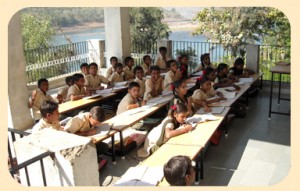
http://www.teach-india.com/index.htm
www.srianandamayima.org/new_projects
The Narmada (Devanagari: नर्मदा, Gujarati: નર્મદા) ,also called Rewa is a river in central India and the fifth largest river in the Indian subcontinent. It forms the traditional boundary between North India and South India and flows westwards over a length of 1,312 km (815.2 mi) before draining through the Gulf of Cambey (Khambat) into the Arabian Sea, 30 km (18.6 mi) west of Bharuch city of Gujarat. Read More > Here <
The Narmada Dam Project is a large hydraulic engineering project involving the construction of a series of large irrigation and hydroelectric multi purpose dams on the Narmada River in India. The project was first conceived of in the 1940s by the country’s first prime minister, Jawaharlal Nehru. The project only took form in 1979 as part of a development scheme to increase irrigation and produce hydroelectricity. Of the thirty large dams planned on river Narmada, Sardar Sarovar Dam (SSD) is the largest structure to be built. It has a proposed final height of 136.5 m (448 ft). The project will irrigate more than 18,000 km2 (6,900 sq mi), most of it in drought prone areas of Kutch and Saurashtra. Critics maintain that its negative environmental impacts outweigh its benefits. Read More: > HERE <
A COMMERICAL AIR TICKETING SERVICE WITH A SOCIAL MOTIVE BY OMKAR SPIRITUAL TOURS – Ever thought that four flight ticket can elevate somebody´s hopes? Ever thaught that every time you fly, somebody´s future prospects could also take wings? Now this can happen by simply booking your air tickets with Omkar Spiritual Tours, a vital and innovative tours and travel service concern.
ALL PROCEEDS FROM THIS COMMERICAL SERVICE WILL GO TOWARDS THE RUNNING OF THE OMKARESHWAR SCHOOL.
Omkar Spiritual Tours is a business venture run by entepreneurs who have begun this work out of a spirit of charity to fund a very active NGO (noncommercial Organization) — a free school for local village children in Omkareshwar, India. Omkar Tours is a commerical project specifically begun for supporting an important social project.
At Omkar Tours, you are our guests and our fellow workers for a noble project, and not mere customers. All our guests receive unparalleled attention and care. Come and experience the spiritual side of India, and at the same time contribute to a worthy cause!
Omkar Tours is not a cold business venture run by entrepreneur, but a vibrant group of dedicated devotees who have begun this work out of a spirit of charity to fund the ashram free school. All the proceeds go for the running of the Omkareshwar School for the local village children, and all the workers connected with this venture are devotees of Ma Anandamayi Ashram and are spiritual people in their own right.
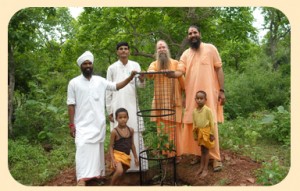
The Wonder of Omkareshwar – In Cooperation with Israelian Agriculture Students a System has found where 98 % of the thousend planted trees survived on this rocky and difficult soil on the island above the Narmada River. The Indian Forest Minister stunned and reported about the many tree planting projects where the trees only on paper exist, because only a few trees surviving in lack of water or difficult soil the first years.
THE SCHOOL ABOVE THE NARMADA RIVER – On the hill above the Ashram (The word ashram comes from “ah—without” and “shram—stress”. An ashram is a spiritual center, meant to be a place of quiet and peace and a place for spiritual discipline and meditation practice.) Swami Kedarnath and Dr. Swami Gurusharanan founded Mata Anandmayi Tripura Vidyapeeth, a thriving school for the local village children. The school is invaluable to the local community in offering free education to children from the poorest living conditions. Without it, the children would almost certainly have no chance for essential development in life.
The school offers a unique style of education: while all the traditional subjects are extensively covered, emphasis is also placed on Dharma (the Eternal Path of Righteousness), moral values and character development, service to society and religious studies.
400 children between the ages of 6-18 currently attend Mata Anandmayi Tripura Vidyapeeth. Demand for places is high and the school is eager to respond, although finding teachers in such a remote part of India is a constant struggle.
The school initiates projects to help their local community and the school, such as litter-picking of the island or removing rubbish from the Narmada River on which it sits. Anyone who’s been to India will recognise the cultural unawareness of litter and it’s impact on the environment. Mata Anandmayi Tripura Vidyapeeth’s shaping of young hearts and minds to appreciate the need to care for their local environment is truly commendable.
Hands-on work to help their community is known as Sewa and instils a sense of respect and responsibility for their local community. This shines through upon meeting the children and is deeply missing in modern societies.
Projects range from small to large in size and continue throughout the school year.
-
FOR AIR TICKET BOOKING; PLEASE CONTACT OMKAR SPIRITUAL TOURS:
-
24-A, Sangam Nagar, Tel: 0731-4208267, Mob.: 9926902690 (Shivam Thakker)
